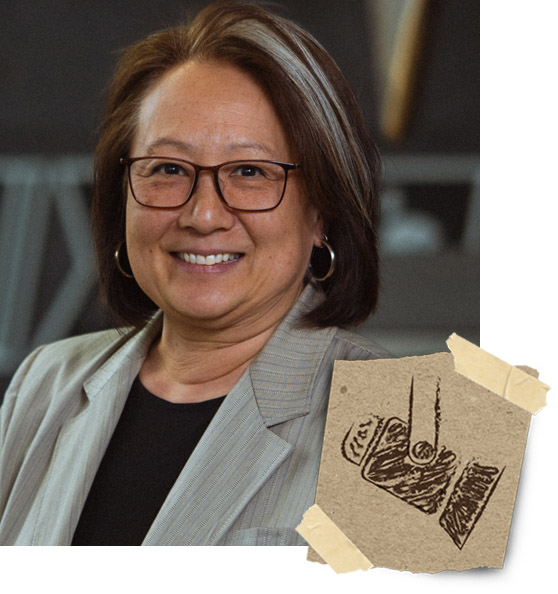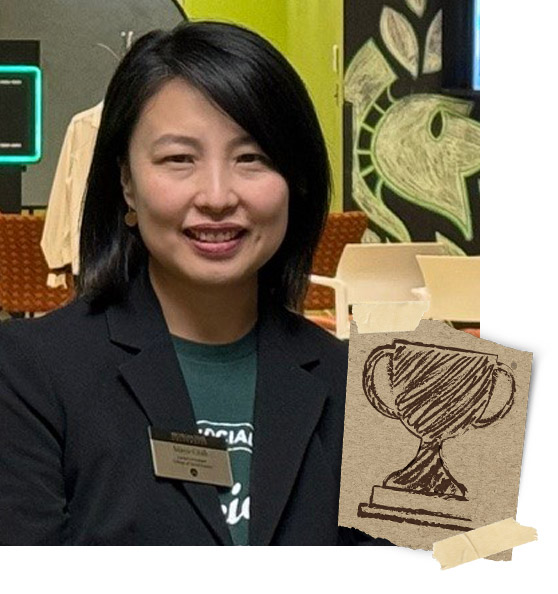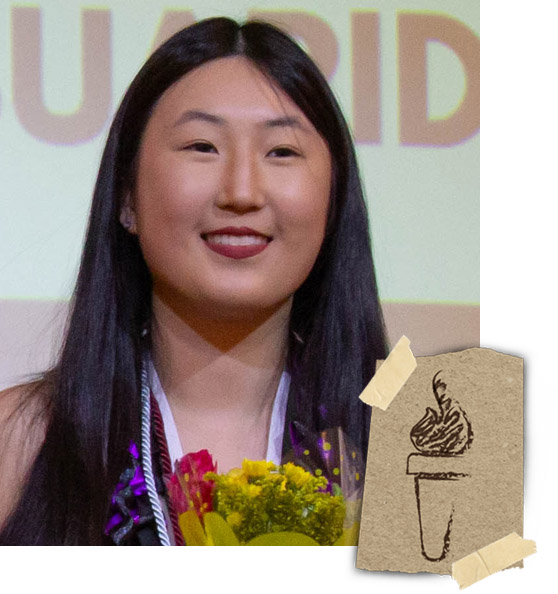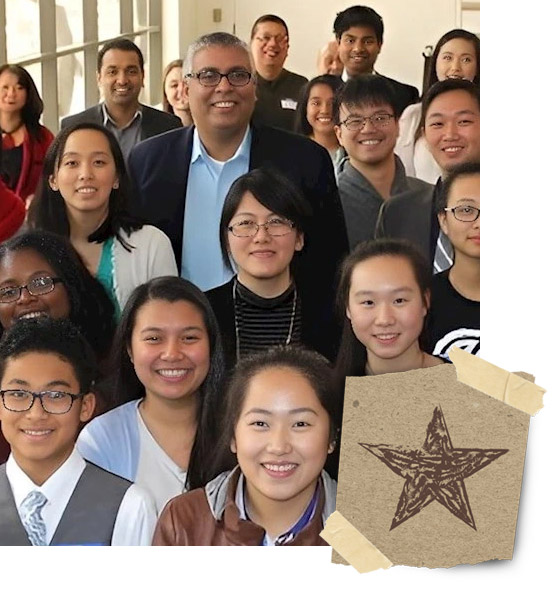Diversity Spotlight: Maggie Chen-Hernandez
May 15, 2024 - Emily Jodway
 Maggie Chen-Hernandez has been making an impact on inclusion and the multicultural space at Michigan State for over 30 years now. A 1987 graduate with degrees in psychology and engineering arts, and one of the founding members of the the Asian Pacific American Student Organization (APASO), Chen-Hernandez has since held roles as Director of the MOSAIC Multicultural Center and Co-Director of the Multi-Racial Unity Living Experience - Intercultural Aide Program (MRULE-ICA), as well as Associate Director for the Office of Cultural and Academic Transitions, and currently serves as Assistant Director of the Diversity, Equity and Inclusion unit of Residence Education and Housing Services (REHS). Chen-Hernandez is constantly striving to make campus a more accessible environment for students of all races and cultural backgrounds. She is our Diversity Spotlight for May during Asian Pacific Islander Desi American (APIDA) Heritage Month.
Maggie Chen-Hernandez has been making an impact on inclusion and the multicultural space at Michigan State for over 30 years now. A 1987 graduate with degrees in psychology and engineering arts, and one of the founding members of the the Asian Pacific American Student Organization (APASO), Chen-Hernandez has since held roles as Director of the MOSAIC Multicultural Center and Co-Director of the Multi-Racial Unity Living Experience - Intercultural Aide Program (MRULE-ICA), as well as Associate Director for the Office of Cultural and Academic Transitions, and currently serves as Assistant Director of the Diversity, Equity and Inclusion unit of Residence Education and Housing Services (REHS). Chen-Hernandez is constantly striving to make campus a more accessible environment for students of all races and cultural backgrounds. She is our Diversity Spotlight for May during Asian Pacific Islander Desi American (APIDA) Heritage Month.
Chen-Hernandez describes herself as a “first generation American-born Taiwanese American,” having been born in the United States to a mother and father who spent the first part of their lives in Taiwan. “When I talk about myself, I always have to talk about my family, because that’s part of who I am,” she said. “I share with folks that my parents came from a really different time, before Taiwan was industrialized.”
Her father grew up the youngest sibling of an impoverished family, and despite most of his other siblings immediately starting to work in their teens, he was afforded the opportunity to go to school. This was one of several factors which led to Chen-Hernandez being raised in a family that greatly valued lifelong learning. In addition, growing up with parents who had a strong socio-political consciousness about their homeland instilled in Chen-Hernandez a strong sense of advocacy and social justice, and a sense of responsibility to uplift and amplify marginalized voices.
Despite not being a first-generation college student, she still found herself lost in the application process, and subsequently navigating college life as a whole, as both of her parents had attended undergrad in Taiwan and during a very different time period. She decided on staying close to home in East Lansing, where her father was a professor in the Electrical Engineering department at Michigan State.
Throughout her youth, Chen-Hernandez felt that her parents kept them very connected to their Taiwanese culture, despite her and her siblings being born in America. In addition to growing up with her maternal grandmother and paternal grandfather who also immigrated from Taiwan, they formed a small community among the few Taiwanese families in the Lansing area.
“Growing up, all the families would come together; I knew all their kids, we were basically cousins, because I didn’t have any cousins here, they were all still in Taiwan,” she explained. “It was like this collective community learning about American culture together. We learned about the significance of certain holidays in America. Socializing, talking together about things like, what the hell is a ‘Thanksgiving turkey?’”
Having grown up in this environment, it wasn’t until she arrived on campus that she became aware of her ‘otherness.’
“I didn’t really have a consciousness around my racial identity until I came to MSU,” she said. “Starting off as a freshman, people would say, ‘Where are you from?’ It confused me. I would say, I’m from here. But they would want to know, ‘No, where are you really from?’”
Chen-Hernandez was viewed as an international student despite being born in America like most of her fellow students. She found that there was a huge lack of understanding behind the distinction of being an international student, and being Asian but growing up in the United States. Her fellow Asian Pacific Desi Islander (APIDA) students joined together from their shared experiences of being misunderstood as Asian Americans; speaking English, understanding pop cultural references, growing up similar to white students while still having cultural differences of their own. All of this led to a desire to have their voices be heard, the catalyst being the murder of Vincent Chin, a Chinese American from Detroit who was killed in a racially motivated attack in 1982 while Chen-Hernandez was a freshman.
“That really galvanized a lot of Asian communities in the United States; it helped us to understand that we needed to come together politically, and it began a process of education about who APIDAs were.”
She and her fellow students came together in 1982 to form APASO, a collective political voice for APIDA students on campus. Chen-Hernandez remained heavily involved with the organization throughout her time at Michigan State and served as President for a year. The formation of APASO and the Asian Pacific American Studies program was recently featured in a story for MSUToday.
After briefly working in the nonprofit sector in Washington, Chen-Hernandez was lured back to Michigan State when her sister informed her that they were looking for someone to serve as the advisor to APASO. She returned to MSU to work with students of color in the multicultural affairs office, eventually earning a masters in College and University Administration from the College of Education while working full-time as a coordinator in the Office of Cultural and Academic Transitions. She also advocated for the creation of Asian Pacific American Studies and support measures for both APIDA students and faculty.
In 1999, she became the director of MSU’s first-ever multicultural space, seeing its transformation from a tiny basement room in a former faculty cafeteria to becoming a full-fledged center in the MSU Union, soon to be its own free-standing building on campus, where marginalized students can feel supported. She spent ten years with the Multi Racial Unity Living Experience-Intercultural Aide Program (MRULE-ICA), and has since been an integral part of REHS.
“It was extremely significant for me as a young professional working in student affairs, because I saw firsthand the power that students had at a university to create change,” she said of her early years doing student advocacy work. “In 1989, I was witness to the Black Student Study-In. This experience was pivotal for me because I had personally worked with and known many of the courageous students who had taken over the Administration Building for 10 days. This is why I so believe in the importance of student activism and empowerment.”
“I take my job really seriously, because I have the potential to help them figure things out, find out what’s important to them, so that they can have purposeful lives once they leave here. Being able to work with students, watching and witnessing for myself the brilliance and drive and determination to create a better world … they represent hope for me.”
For Chen-Hernandez, the importance of APIDA Heritage Month lies with the opportunity it gives us to be more inclusive in how we educate ourselves on the multifaceted communities of APIDA individuals.
“We have to be continually educating ourselves as well as everybody else around the growing diversity in our APIDA community,” she explained. “There’s no monolith of an APIDA person. If we can learn from each other and our unique experiences, maybe we won’t label people as ‘other’ so much, and we won’t make assumptions, and we can dispel stereotypes. Every single APIDA individual has a very distinct and unique kind of story; we have commonalities and we have differences. It’s this notion of both the universal and the particular, and valuing both.”
Read more:

Diversity Champion
Faculty/Staff
Maya Craft
Maya Craft has spent over 10 years at Michigan State, working to make the post-graduation and job searching experience more navigable for students through professional development. She is particularly interested in assisting international and first-generation students along their collegiate and career journey, helping them to find jobs both here and abroad. Craft currently serves as Assistant Director of the Career Services Network in the College of Social Science.

Diversity Torch
Student
Megan Smejkal
Megan Smejkal is a senior majoring in political science, economics and history. She is the Chief Diversity and Inclusion Officer for the MSU Residence Halls Association, Cultural Vogue Chair for the Asian Pacific American Student Organization, President of the Professional Asian Student Organization, and a member of the Women’s Leadership Institute. Originally an adoptee from Korea, Megan grew up in Mount Prospect, Illinois.

Special Feature
Asian Pacific American (APA) Studies
We shine a special spotlight on our APA Studies Program that is celebrating their twentieth year. Congratulations!

